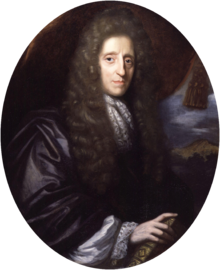
Back John Locke Afrikaans John Locke ALS ጆን ሎክ Amharic John Locke AN John Locke ANG جون لوك Arabic دجون لوك ARY جون لوك ARZ John Locke AST Con Lokk Azerbaijani
John Locke | |
|---|---|
 | |
| Born | 29 August 1632 |
| Died | 28 October 1704 (aged 72) Essex, England |
| Era | 17th-century philosophy (Modern Philosophy) |
| Region | Western Philosophers |
| School | British Empiricism, Social Contract, Natural Law |
Main interests | Metaphysics, Epistemology, Political Philosophy, Philosophy of Mind, Education |
Notable ideas | Tabula rasa, "government with the consent (permission) of the governed"; state of nature; rights of life, liberty and property |
Influences
| |
Influenced
| |
| Signature | |
 | |
John Locke (pronounced /ˈlɒk/; 29 August 1632 – 28 October 1704), known as the Father of Liberalism,[2][3][4] was an English philosopher and physician. His writings on the theory of social contract influenced Voltaire and Rousseau, many Scottish Enlightenment thinkers, and the American revolutionaries. His ideas are mentioned in the American Declaration of Independence.[5]
Locke's theories were usually about identity and the self. Locke thought that we are born without thoughts, and that knowledge is instead determined only by experience.[6]
- ↑ Peter Laslett (1988). "Introduction: Locke and Hobbes". Two Treatises on Government. Cambridge University Press. p. 68. ISBN 9780521357302.
- ↑ Locke, John. A Letter Concerning Toleration Routledge, New York, 1991. p. 5 (Introduction)
- ↑ Delaney, Tim. The march of unreason: science, democracy, and the new fundamentalism Oxford University Press, New York, 2005. p. 18
- ↑ Godwin, Kenneth et al. School choice tradeoffs: liberty, equity, and diversity University of Texas Press, Austin, 2002. p. 12
- ↑ Becker, Carl Lotus. The Declaration of Independence: A Study in the History of Political Ideas Harcourt, Brace, 1922. p. 27
- ↑ Baird, Forrest E.; Walter Kaufmann (2008). From Plato to Derrida. Upper Saddle River, New Jersey: Pearson Prentice Hall. pp. 527–529. ISBN 978-0-13-158591-1.